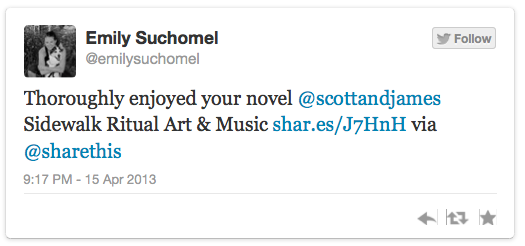Print books as social media catalysts

Are you thinking, print books? Come on, Scott. How are print books related to social media?
I'm serious. Print books are not a silo separate from your social media networks. In fact, I think they can be a powerful way to catalyze social media action, and in fact be an effective way to bring social media into the "offline" world in a meaningful way.
Here are some ways I've used print books in direct connection with social media:
- Reach more readers
- Gain traffic
- Make sales
1. Readings: Whenever I do a reading, I promote it like crazy over social media. The great thing about a reading, whether at a book release party or as part of a series, is that it is a chance to sell print copies of your books immediately following. There is a chance to use your social media sharing as a contest, offering one free copy of your print book to one of the attendees to your reading. That contest can be part of your promotions, and entice more people to show up in person. Alternately, the moment when you give/sell your print book to someone can be the best moment to say, "Thanks for reading. If you like it, please tweet/post about it on xyz network." I do that a lot and see the shares come to fruition weeks later.
2. Direct tie-in: When I published my novel Sidewalk Ritual, I included a "password" in the opening credits and on the last page. Readers could take the password and open up a secret page on my website to see art and music inspired by and created to go along with the book. I've seen a lot of readers respond to those extras, even sharing them out over social media. Here's an example:

3. Goodreads Giveaways: Goodreads is a book-focused social media network where big readers talk about what books they're reading and what they think of them. They also allow any author to do a print book giveaway (no ebooks right now). Essentially you offer a set number of copies of your book, Goodreads promotes your offer to their network of readers and picks winners, and then you send the winners a print copy of hte book. Often those winners will share with their network about your book, talk about it on Goodreads, or check out more about you online.
4. Amazon Reviews: Getting Amazon reviews is as important as it is difficult. One way I've found is to give away print books to second degree connections (new people you meet at a friends' party or family connections) and say, "I'm happy to give you a book for free. If you like it, could you review it on Amazon?" This happens often enough for me to see the results, and those reviews have a big impact on social proof for other shoppers.
5. Kickstarter: If you are planning to crowdfund a book, you'll need compelling and interesting rewards. I found that while an ebook falls somwhere around $8-$10 as a reward, I offered an autographed physical copy of my book for $25 and it was even more popular. Even people using an innovative platform like Kickstarter want to have a tangible reward at the end of the process.
Imagecourtesy of miheco via flickr

3 comments